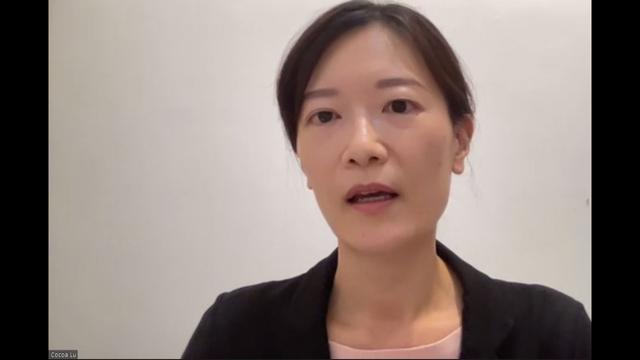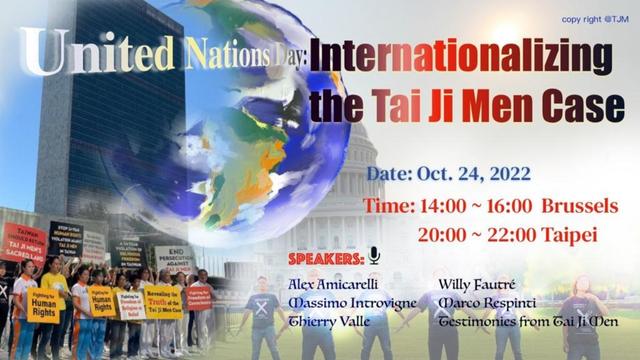Scholars, NGO activists, and Tai Ji Men dizi reflected on United Nations Day and why the Tai Ji Men case should be taken seriously by international institutions.
by Daniela Bovolenta

On October 24, 2022, United Nations Day, CESNUR, the Center for Studies on New Religions, and the Brussels-based NGO Human Rights Without Frontiers organized one of their bi-monthly webinars on the Tai Ji Men case. The theme was “United Nations Day: Internationalizing the Tai Ji Men Case.”
Alessandro Amicarelli, a London-based human rights attorney and the president of the European Federation for Freedom of Belief (FOB), reminded the audience that October 24 was selected as United Nations Day because on October 24, 1945, the United Nations Charter entered into force. He then presented a video where UN Secretary General Antonio Gutierres invited to celebrate United Nations Day in a year when the United Nations “is challenged as never before.”
Amicarelli then introduced the first three speakers. Massimo Introvigne, an Italian sociologist who serves as managing director of CESNUR and editor-in-chief of Bitter Winter, discussed German philosopher Immanuel Kant’s 1795 book “Perpetual Peace,” which included the first proposal for a society of nations. Introvigne argued that many of Kant’s ideas are surprisingly modern, including his theory that world peace and conscience are inextricably connected.
While Kant’s notion of conscience was rooted in German Protestantism and different from the one taught by Dr. Hong Tao-Tze, the Shifu (Grand Master) of Tai Ji Men, both insist on the idea that world peace can only be achieved through a turn to conscience. Introvigne concluded by noting that connecting peace and conscience teaches people to think independently. This does not please corrupt bureaucrats and politicians, which explains why Tai Ji Men has been consistently slandered and persecuted.

Thierry Valle, president of the ECOSOC-accredited NGO CAP-LC (Coordination des Associations et des Particuliers pour la Liberté de Conscience, i.e., Coordination of Associations and Individuals for Freedom of Conscience), reviewed the history of the United Nations and the crises it faced. He emphasized the roles of the accredited NGOs, and of NGO coalitions, to further the aims of the United Nations.
Dr. Hong, Valle said, was himself instrumental in bringing together NGOs and member states by organizing important events and creating the movement that led to the U.N. adopting April 5 as the International Day of Conscience. On the other hand, Valle concluded, now a different coalition of NGOs, including CAP-LC, has been created to support Tai Ji Men in their fight for justice and against persecution.
Willy Fautré, co-founder and director of Human Rights Without Frontiers, discussed the difficult moment of the United Nations, which appears unable to stop war and atrocities in Ukraine, Ethiopia, and elsewhere. Fautré invited to look at Dr. Hong’s appeal to conscience as an effective way of making the United Nations work. He then introduced a video about the October 16 performances and rituals of the “Global Prayers for Love and Peace” and the “One-Minute Silence” organized by Tai Ji Men Qigong Academy at the National Taiwan University Sports Center, where 5,000 gathered, with a total audience of 20,000, including all those connected via the Internet.
The full video of the webinar.
Fautré presented the testimony of Dr. Yeh Yang-Chun, a biotechnology expert who came from the United States to Taiwan answering a call from the Taiwan Ministry of Economic Affairs. When in Taiwan, it took him more than ten years to explain that what the National Taxation Bureau (NTB) taxed as a salary was in fact a stock option. Meanwhile, the NTB had prevented Yeh from leaving Taiwan, and his family was broken.

Fautré then introduced the testimonies of four Tai Ji Men dizi (disciples). Cocoa Lu, a former optical application engineer in an American company, reported that she recently visited Taiwan, where, by discussing the Tai Ji Men case, she realized that many regard the local democracy as “nearly empty.” The tax system is a sort of black hole where it seems justice cannot be obtained by citizens. Lu mentioned Dr. Hong’s teaching that we all learn from our mistakes. She expressed the hope that Taiwanese politicians and bureaucrats will be capable of doing the same, as she “does not want Taiwan, my homeland, to become a democracy in which all that glitters is not gold.”

Clair Lo, a postdoctoral fellow at the Institute of Biomedical Sciences, Academia Sinica, reported on her practice of qigong and martial arts with Tai Ji Men since she was a child. Later, she participated in some of the international peace events organized by Dr. Hong, including the World Bell of Peace and Love Ceremony in 2018 at the National Drama Theater in Taiwan, attended by local and international authorities.
In Taiwan, however, she had the impression that, in the words of 19th-century British Minister William Gladstone, the “love of power” has replaced the “power of love.” But it is never too late to put love back in its rightful place, she concluded, as demonstrated by the recent October 16 Global Prayers for Love and Peace.

Claire Liang, a master student, also had the experience of accompanying Dr. Hong to international events. The festive atmosphere of these gatherings for love and peace contrasted, Liang said, with the mistreatment of Tai Ji Men by Taiwan’s bureaucrats and even of peaceful protesters by the police. Liang reiterated that the harassment of Tai Ji Men is not a question of money and taxes only, but a religious liberty issue that should be taken seriously by international institutions.
Kavien Lin, a project management director at an IC design company, recalled how when the Tai Ji Men case started and Dr. Hong was slandered by the media, her friends and family asked her whether continuing as a dizi was really the right thing to do. She resisted all pressures, but some of her friends left Tai Ji Men. Although Dr. Hong and Tai Ji Men were later exonerated from all charges, including tax evasion, Lin still wonders how many lost the opportunity of joining the movement and changing their lives because of the slander.
Marco Respinti, an Italian scholar and journalist and the director-in-charge of Bitter Winter, offered the conclusions of the webinar. He insisted on the connections between the by-monthly Tai Ji Men webinars organized by CESNUR and Human Rights Without Frontiers and the United Nations days of observance. In a way, Respinti said, all these webinars are about both the United Nations and internationalizing the Tai Ji Men case.
He reviewed the problems the United Nations encountered during their 77 years of existence, and expressed his agreement with other speakers that a root cause of the lack of peace in the world is that the essential connection between peace and conscience, on which Dr. Hong insists, has been forgotten. In Taiwan, Respinti said, this lack of conscience has affected bureaucrats and politicians, creating and perpetuating the Tai Ji Men case. Total and perfect peace is impossible in the human world, Respinti said. However, with conscience, we can at least solve some problems and uproot some of the worst evils we have to confront.

The event concluded with another video featuring messages by world leaders for the October 16 event featuring the Global Prayers for Love and Peace.
Source: Bitter Winter

